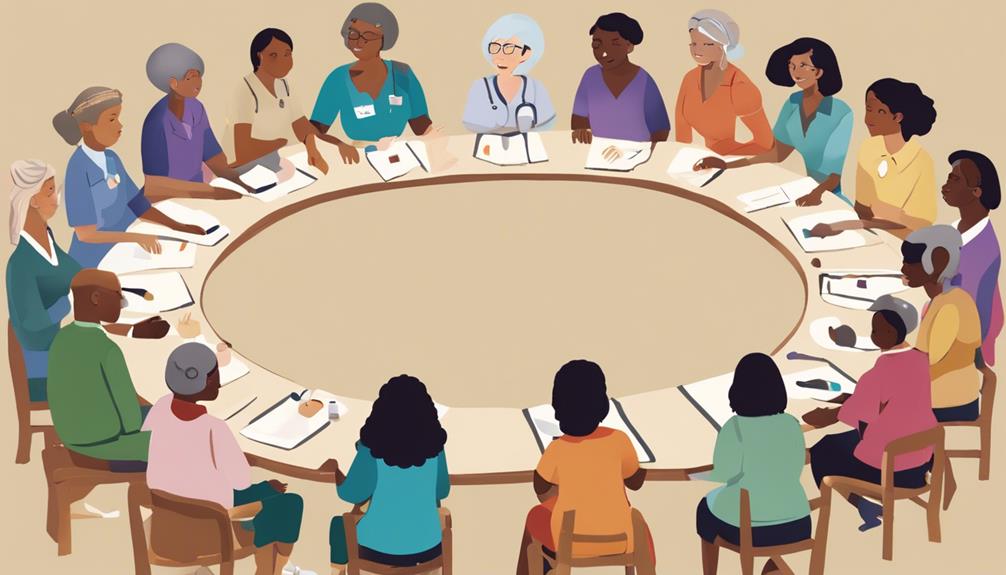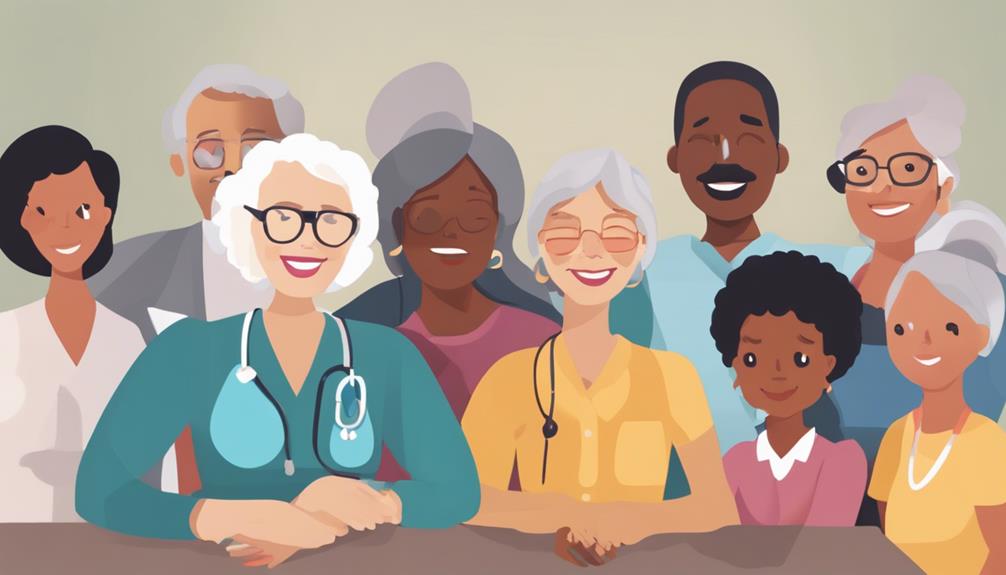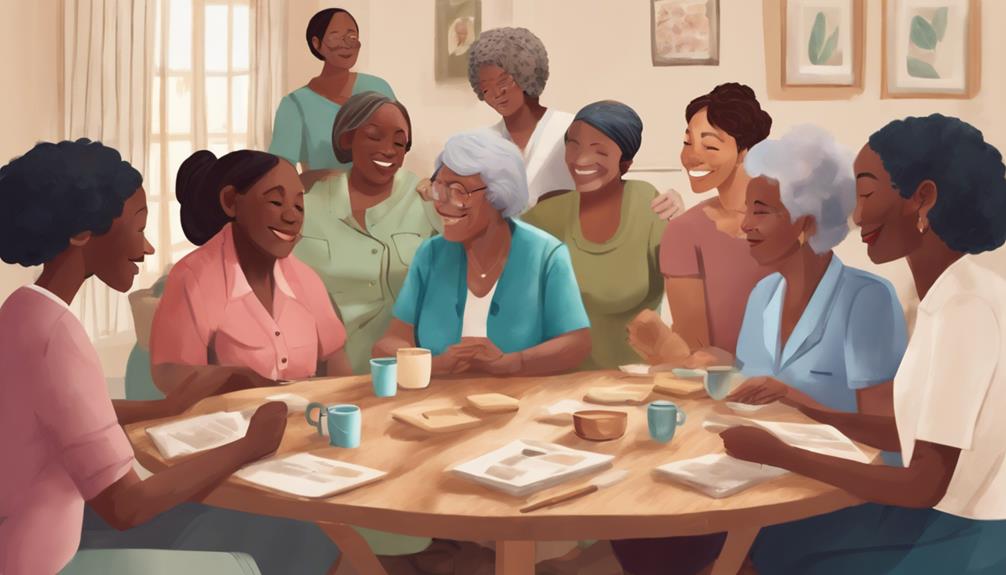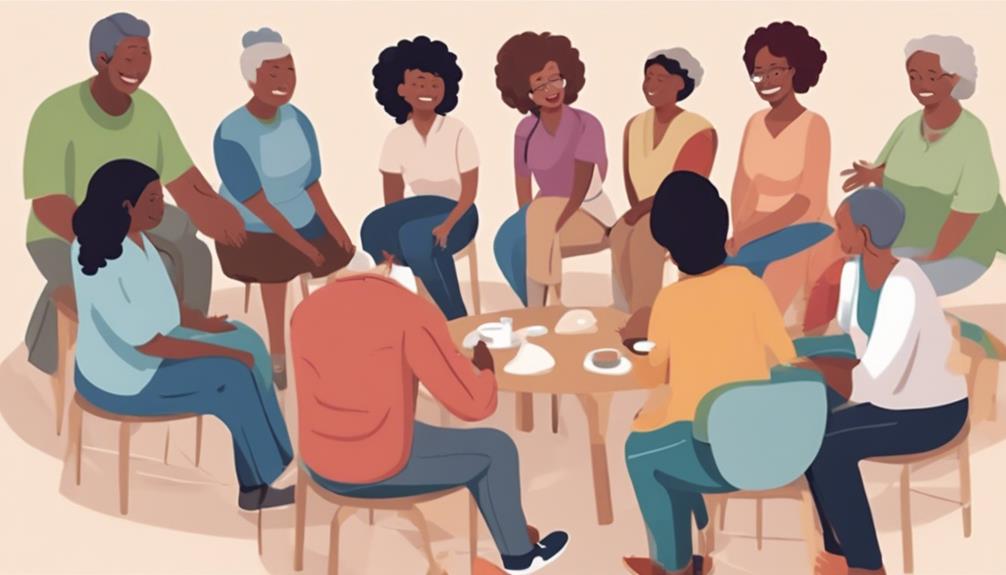Caregiver support groups are crucial for providing emotional, social, and practical assistance to those who are caring for loved ones. These groups create a safe environment to share experiences, gain insights, and connect with others who are going through similar challenges. Participants share coping strategies, practical tips, and emotional support while combating feelings of isolation. By joining these groups, caregivers can access valuable resources, make informed decisions, and contribute to a supportive community. The groups promote resilience, provide guidance, and help fight against stigma. To maximize the benefits, actively engage, build relationships, prioritize self-care, and take part in group activities. Experience the invaluable support that these groups offer.
Key Takeaways
- Caregiver support groups offer emotional support, practical advice, and a sense of community.
- They provide a safe space for sharing experiences, reducing isolation, and fostering empathy.
- Peer support helps caregivers navigate challenges, gain insights, and access valuable resources.
- Collaboration with local organizations enhances access to comprehensive support and educational materials.
- Success stories shared in groups inspire, empower, and improve caregivers' skills and well-being.
Definition of Caregiver Support Groups
Caregiver support groups are fundamentally structured gatherings where we caregivers come together to share experiences, challenges, and strategies. These groups provide a safe space for caregivers to connect with others facing similar situations. By sharing our stories and difficulties, we not only receive emotional support but also gain valuable insights into how to navigate the caregiving journey.
Caregiver support groups play a vital role in providing the necessary assistance for those caring for loved ones. They offer a platform where we can openly discuss our challenges, seek guidance, and share resources that may be helpful in our caregiving roles.
In these groups, facilitators play a significant role in maintaining a supportive environment and guiding discussions. Whether in community centers, hospitals, religious institutions, or online platforms, caregiver support groups offer a sense of community and understanding. Through these gatherings, we caregivers can find solace, comfort, and practical advice that can make a meaningful difference in our caregiving responsibilities.
Emotional Support for Caregivers

Caregiver support groups offer an essential outlet for us to connect with others who understand our struggles. By sharing our experiences, we can find comfort in knowing we aren't alone in our challenges.
These groups provide a space for us to exchange stress relief methods and coping strategies, helping us navigate the emotional rollercoaster of caregiving with more resilience.
Peer Empathy Sharing
Engaging in peer empathy sharing within caregiver support groups fosters a crucial connection among members, promoting emotional understanding and mutual support. Caregivers find solace in knowing that others in similar situations validate their experiences and offer encouragement. This emotional support plays a pivotal role in helping caregivers manage stress and develop effective coping strategies for their demanding roles.
Within the safe space of these groups, individuals feel a sense of belonging, reducing feelings of isolation that often accompany caregiving responsibilities. Peer empathy sharing creates a supportive environment where members can openly express their emotions and receive compassion from those who truly understand. This shared experience enhances the overall support group dynamic, emphasizing the importance of empathy and solidarity in caregiving journeys.
Stress Relief Methods
How can we effectively alleviate stress and provide emotional support for caregivers within support groups? One effective way to alleviate stress and provide emotional support for caregivers in support groups is by fostering a sense of community and encouraging open communication. Sharing personal experiences and challenges in a non-judgmental environment can help caregivers feel less isolated and more understood. Additionally, introducing discussions around the benefits of hugs for dementia can offer insightful strategies for care techniques, as physical touch often fosters comfort and emotional connection for individuals living with dementia, while simultaneously allowing caregivers to experience a sense of closeness and fulfillment.
Caregiver support groups serve as important platforms for emotional expression, mutual understanding, and stress relief. Within these groups, caregivers can openly share their challenges, fostering a sense of validation and empathy from peers facing similar situations. This mutual understanding not only provides emotional support but also equips caregivers with essential coping strategies to manage stress and emotional strain effectively.
Additionally, building meaningful social connections within these support groups can help alleviate feelings of isolation and burnout. By promoting emotional resilience through shared experiences and support, caregiver support groups play an essential role in ensuring the well-being of those providing care to others.
Coping Strategies Exchange
To effectively support caregivers in managing stress and finding emotional solace, exchanging coping strategies within support groups becomes an essential avenue for shared understanding and mutual empowerment. Caregiver support groups offer a safe space for emotional expression, where members share experiences and practical advice to navigate the challenges of caregiving. These interactions foster mutual understanding and empathy, providing caregivers with the tools needed to cope effectively.
Sharing Experiences and Knowledge

Caregiver support groups offer a space where we can share our caregiving experiences, learn from one another, and provide valuable support.
We exchange practical tips on managing daily challenges, form emotional bonds, and gain a sense of camaraderie.
These groups create opportunities for peer support, where we can share knowledge and strategies to enhance our caregiving journey.
Peer Support Benefits
Within caregiver support groups, members benefit greatly from the shared experiences and knowledge exchange, fostering a strong sense of camaraderie and understanding.
Peer support offers caregivers practical advice and emotional support, helping them navigate the complexities of the caregiving journey. By sharing experiences and strategies for managing caregiving responsibilities, members gain valuable insights and feel part of a supportive community.
This sense of community provides a safe space for caregivers to open up about their challenges, seek guidance, and offer encouragement to one another. Through peer support, caregivers not only receive assistance but also contribute to the well-being of others facing similar situations, creating a network of mutual aid and understanding within the support group.
Exchange Practical Tips
Amidst the diverse array of caregiving challenges and triumphs discussed in support groups, members actively exchange practical tips, sharing invaluable experiences and knowledge to enhance their caregiving skills. By sharing practical advice, emotional support, and coping strategies, caregivers in these groups benefit from a wealth of caregiver-specific information and community services. The exchange of diverse experiences leads to personal growth, empowerment, and a deeper understanding of caregiving dynamics. To illustrate the depth of practical tips shared in these groups, consider the following table:
| Practical Tips | Benefits |
|---|---|
| Create a caregiving schedule | Organized care provision |
| Utilize respite care services | Prevent caregiver burnout |
| Seek financial assistance | Alleviate financial stress |
In these support groups, members learn from each other's experiences, finding valuable resources and strengthening their caregiving skills.
Emotional Bonding Opportunities
As we share our experiences in caregiver support groups, we uncover valuable emotional bonding opportunities through the exchange of knowledge and personal stories. Peer support within these groups allows us to connect on a deeper level, offering understanding and empathy.
By sharing our diverse experiences and coping strategies, we not only receive practical advice but also validation for the challenges we face as caregivers. This sense of community fosters a supportive environment where we can lean on each other for encouragement and guidance.
Through these interactions, we build strong relationships based on mutual respect and shared experiences, creating a space where emotional connections thrive, and we feel understood and supported in our caregiving journey.
Access to Resources and Information

Caregiver support groups consistently provide essential assistance by offering access to a wide range of resources and reliable information. These groups serve as valuable platforms for caregivers to find the support they need in their caregiving journey. By being part of support groups, caregivers gain access to critical information that empowers them to make well-informed decisions regarding their loved ones' care. Within these groups, caregivers can ask questions, seek guidance on challenges they face, and receive trustworthy information to help them navigate the complexities of caregiving.
Furthermore, caregiver support groups often collaborate with local organizations and agencies to enhance access to a variety of resources. Through partnerships with healthcare providers and social service agencies, support groups can offer comprehensive support to caregivers. Educational materials, referrals, and other essential resources are readily available to caregivers through these groups, ensuring they have the tools and information necessary to provide the best care possible to their loved ones.
Success Stories From Support Groups

How do success stories from support groups inspire and motivate caregivers facing challenging situations?
Success stories from caregiver support groups showcase positive outcomes and effective strategies in managing caregiving challenges. Members in support groups share personal triumphs, demonstrating resilience and empowerment in their caregiving journey.
Hearing these stories provides inspiration, hope, and motivation for caregivers in difficult situations. The shared experiences highlight the impact of emotional support and practical advice, improving caregivers' well-being.
These stories also serve as testimonials to the benefits of joining support groups, enhancing caregiving skills and overall quality of life. Through these success stories, caregivers find encouragement, learn new approaches, and realize they aren't alone in their struggles.
It's through these tales of overcoming obstacles that caregivers gain strength, confidence, and a sense of community within the caregiver support groups.
Overcoming Challenges in Support Groups

Moving through the hurdles within support groups often leads caregivers to discover newfound strength and resilience in their caregiving journey. Caregiver support groups play an essential role in helping individuals overcome various challenges they face in their caregiving responsibilities. Here are some key ways in which caregivers can navigate these obstacles effectively:
- Community: Being part of a support group creates a sense of belonging and community, reminding caregivers that they aren't alone in their journey.
- Understanding: Sharing experiences within the group fosters understanding and empathy among members, leading to valuable insights and perspectives.
- Practical Advice: Support groups offer practical guidance on managing caregiving responsibilities, helping caregivers tackle daily challenges with more ease.
- Coping Strategies: Learning and implementing coping strategies shared in support groups can help caregivers reduce stress and improve their overall well-being.
Addressing Stigma and Misconceptions

Addressing stigma and misconceptions surrounding caregiving involves creating a safe and open space for discussion within support groups. Caregiver support groups play an important role in challenging misconceptions by sharing diverse experiences and perspectives.
Through open discussions, caregivers gain understanding and empathy for each other's challenges, working together to combat societal attitudes that may stigmatize caregiving roles. These groups provide education and information to dispel myths and stereotypes, fostering mutual support among members.
Tips for Maximizing Group Experience

To enhance your experience in caregiver support groups, actively engaging in discussions and forming connections with other members is essential. By participating in group activities and sharing personal experiences, you can maximize the benefits of being part of a supportive network.
Here are some tips for making the most of your support group experience:
- Participate: Contribute to discussions and listen actively to others' stories.
- Build Relationships: Connect with fellow members to establish a strong support system.
- Utilize Resources: Make use of the resources provided by the group for practical advice and information.
- Practice Self-Care: Prioritize your well-being to prevent burnout and maintain emotional health.
Future of Caregiver Support Groups

As caregiver support groups evolve to meet the changing needs of members, the integration of technology and innovative solutions is shaping the future landscape of support services. Future trends point towards the use of AI-driven platforms to offer personalized support and tailored resources to caregivers. These platforms can provide specific assistance based on individual needs, making the caregiving journey more manageable and effective.
Additionally, telehealth services are becoming increasingly popular, enabling caregivers to access remote counseling and support from the comfort of their homes.
Collaborations with healthcare providers and insurance companies are enhancing the offerings of support groups for caregivers. By working together, these entities can guarantee that caregivers receive thorough support that addresses both their emotional and practical needs. This collaboration can lead to the development of enhanced support group offerings that cater to a wide range of caregiver requirements. In the future, caregivers can expect more accessible, tailored, and technologically advanced support services to assist them in their crucial role.
Frequently Asked Questions
What Are the Goals of a Caregiver Support Group?
In a caregiver support group, our goals revolve around offering emotional support, practical advice, and resources to fellow caregivers. We aim to foster understanding, provide coping strategies, and create a safe space for sharing experiences.
What Role Does Social Support Have in Caregiving?
Social support is a lifeline in caregiving. It lessens stress, fosters connections, and validates emotions. Through peer groups, we refine our coping skills and form lasting bonds. Together, we find strength and solace.
What Is Emotional Support in Caregiving?
In caregiving, emotional support involves offering empathy, understanding, and encouragement to caregivers. It validates feelings, reduces isolation, and provides a safe space for expressing emotions. Emotional support helps manage stress, cope with challenges, and prevent burnout.
Why Caregiver Support Is Important?
Support is essential for caregivers. We rely on each other for strength and understanding. Together, we navigate challenges, find comfort, and learn to prioritize self-care. In unity, we thrive, providing care with compassion and resilience.
Conclusion
To sum up, caregiver support groups play an essential role in providing emotional, social, and practical assistance to those in need. By sharing experiences, offering resources, and overcoming challenges together, these groups create a supportive community for caregivers.
It's important to maximize the group experience by actively participating and utilizing the available resources. As we look towards the future, caregiver support groups will continue to be a valuable resource for those in need of support and understanding.









